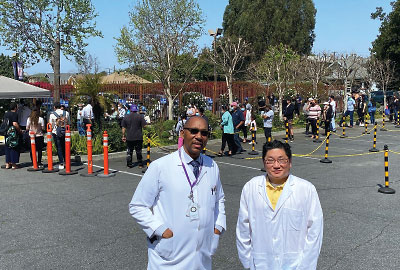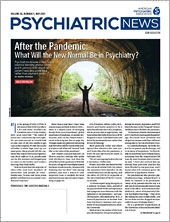As an acute psychiatric hospital located in diverse South Los Angeles, Kedren Health has prioritized the vaccination of the highest-risk populations in L.A. County for COVID-19 and helping them navigate the pandemic. To stop this virus, we must protect our most vulnerable citizens. A significant number of our patients suffer from serious mental illness (SMI), which increases their likelihood of death from COVID-19 by up to a factor of 2.7. Therefore, a vital component prior to administering the vaccine is educating our patients. We take this matter seriously as most of our patients are acutely mentally ill when they are admitted and have some degree of cognitive impairment. They also have or are at risk for such comorbidities as diabetes, heart disease, and lung conditions.
Once patients are stabilized medically and able to attend group therapy, our multidisciplinary teams approach them about being vaccinated for COVID-19. These teams consist of psychiatrists, psychologists, and occupational therapists. Educating patients about the vaccine is an ongoing process because many patients suffer from fear and paranoia. As we establish their trust over time, most of our patients voluntarily give consent to vaccination. Moreover, I have been increasingly encouraged to find that a good number of our patients are knowledgeable about COVID-19, as well as the morbidity/mortality associated with it.
Many of our community members face numerous barriers to getting vaccinated, including homelessness, low socioeconomic status, lack of transportation, and difficulty in securing an appointment. These challenges are exacerbated for the Pfizer and Moderna vaccines, which require two appointments. These difficulties are strikingly prevalent for members of certain minority groups, who also tend to have a higher incidence of COVID-19. Compared with the general population, COVID-19 infection rates are twice as high among African Americans and five times as high among Hispanic populations. Moreover, even though these communities are suffering an inordinate burden, many African Americans and Hispanics are more hesitant to take the vaccine.
We are currently taking targeted measures to combat the accessibility issue. One of them is community outreach. We send our employees into local communities and attempt to dispel any misinformation or hesitancy that community members may hold, set up appointments, and arrange transportation. Those most in need must be aware of the benefit that the vaccine provides to themselves and their loved ones. To reach herd immunity, we need at least 70% of individuals to be vaccinated.
Kedren Community Health Center is one of the few hospitals in the state with the requisite capacity to house numerous vaccine vials and do so safely. Initially we prioritized the Johnson and Johnson vaccine because of its advantages for underresourced communities. However, because the FDA decided to hold its use pending further review of potential risks as this issue went to press, we are continuing to use the other options.
We hope that the measures I have outlined in this article contribute to improved health outcomes and can serve as a model to other health systems nationwide. Kedren Health is committed to serving the community of South Los Angeles. We will continue to re-evaluate, expand, and bolster our vaccination approaches to help end this pandemic. ■
I want to thank our research assistant Ayush Arora for assistance with data collection.
References
3.
Khubchandani J, Sharma S, Price JH, Wiblishauser MJ, Sharma M, Webb FJ. COVID-19 Vaccination Hesitancy in the United States: A Rapid National Assessment. J Community Health; 2021 Apr;46(2):270-277. doi: 10.1007/s10900-020-00958-x.
4.
Malik AA, McFadden SM, Elharake J, Omer SB. Determinants of COVID-19 Vaccine Acceptance in the US. EClinicalMedicine. 2020;26:100495. doi: 10.1016/j.eclinm.2020.100495.


